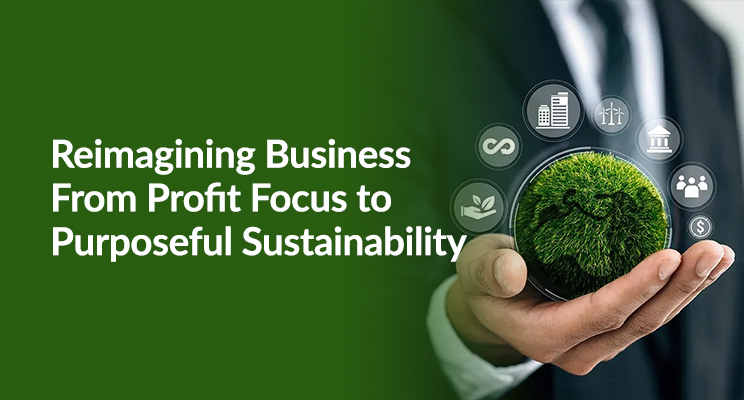In recent years, many businesses have concentrated on maximising profits, frequently overlooking environmental and social issues. However, the current landscape is changing as consumers, investors, and employees increasingly expect companies to align their operations with wider values. Organisations are beginning to understand that adopting sustainable practices can enhance long-term profitability, mitigate risks, and build brand loyalty.

The Limitations of Profit-Only Focus
Businesses focused solely on profit face environmental, social, and financial challenges. Embracing sustainability ensures long-term growth, innovation, and competitiveness amid rising consumer and regulatory demands for ethical practices.
Environmental Damage: When short-term profits take precedence over sustainability, it results in the exploitation of resources, increased pollution, deforestation, and poor waste management. This exacerbates the climate crisis, leads to biodiversity loss, and accelerates resource depletion.
Social Inequities: Models that prioritise profit contribute to income inequality, labour exploitation, and unsafe working conditions. Outsourcing to areas with lax regulations further entrenches poverty and social unrest, ultimately harming a company’s reputation and customer loyalty.
Financial Risks: A singular focus on profits can expose businesses to various hidden risks, including rising operational costs, regulatory fines, and competitive disadvantages from stricter environmental policies. Not adapting to these changes can jeopardise both reputation and financial health.
Short-Term Thinking and Innovation Stagnation: An emphasis on immediate profits can hinder long-term innovation, slowing the adoption of sustainable technologies and solutions, and future competitiveness.
Changing Consumer Expectations: Today’s consumers are increasingly seeking ethical and sustainable products. Companies prioritising profits over purpose may market relevance and consumer loyalty to be more ethical and sustainable.
Defining Purposeful Sustainability
Purposeful sustainability begins with a change in mindset—understanding that profit is not the only goal but a tool to fulfil a greater mission. Companies that embrace this perspective strive to generate value for all stakeholders, including employees, customers, communities, and the environment, rather than just focusing on shareholders. This commitment to purpose ensures that economic success aligns with social and environmental advancement.
Environmental Sustainability
Companies strive to reduce their environmental impact by embracing renewable energy, cutting down on waste, and adopting circular economy practices.
Social Responsibility
Businesses promote social equity by ensuring fair wages, safe workplaces, diversity, and community support.
Ethical Governance
Transparency, ESG integration, and accountability are key to ethical governance. Equitable and inclusive practices build stakeholder trust and prioritise long-term impact.
Real-World Examples of Purposeful Sustainability
1. Tesla revolutionized the automotive industry by aligning its purpose with sustainability, focusing on creating a future free of fossil fuels through innovative electric vehicles.
2. LEGO has committed to using sustainable materials for all of its products by 2030, reducing waste and energy consumption while still delivering high-quality toys.
3. Danone embraces the “One Planet. One Health” vision, integrating environmental and social goals into its business strategy to create shared value for society.
Practical Steps for Businesses to Transition to Purposeful Sustainability
Shifting from a profit-driven approach to one that emphasises purposeful sustainability demands careful planning, dedication, and teamwork throughout the organisation. Although this transition can be challenging, the following practical steps outline a straightforward path for businesses aiming to weave sustainability into their fundamental operations.
Rethink Business Models and Operations
- Shift towards a circular economy by emphasising recycling, reusing, and minimising waste.
- Implement sustainable supply chain practices that prioritise ethical and local sourcing.
- Create eco-friendly products that utilise sustainable materials and are designed for recyclability.
Incorporate ESG Goals into Company Strategy
- Define clear sustainability objectives, such as achieving net-zero emissions or utilising 100% renewable energy sources.
- Integrate sustainability into corporate governance, ensuring that executives are held responsible for ESG results.
- Implement consistent sustainability reporting to enhance transparency, adhering to global standards like GRI or TCFD.
Foster a Culture of Sustainability
- Involve employees by providing education, training, and incentives that encourage sustainable practices.
- Secure commitment from leadership to prioritise sustainability in all decision-making processes.
- Promote collaboration across departments to weave sustainability into every aspect of the business.
Work with External Stakeholders
- Collaborate with NGOs and industry organisations to ensure alignment with global best practices.
- Involve consumers by communicating sustainability initiatives and providing opportunities for them to get involved.
- Advocate for policy and regulatory changes that promote sustainability in-laws.
Harness Technology for Greater Efficiency and Transparency
- Leverage data analytics to enhance energy efficiency, manage resource use, and minimise waste.
- Adopt blockchain technology to ensure transparency throughout supply chains.
- Employ automation and AI to cut down on energy use and streamline logistics.
Measure, Monitor, and Adjust Sustainability Efforts
- Monitor key performance indicators (KPIs) such as carbon emissions and waste reduction.
- Perform regular sustainability audits to evaluate progress and pinpoint areas for improvement.
- Continuously refine sustainability strategies, making adjustments based on feedback and outcomes.


